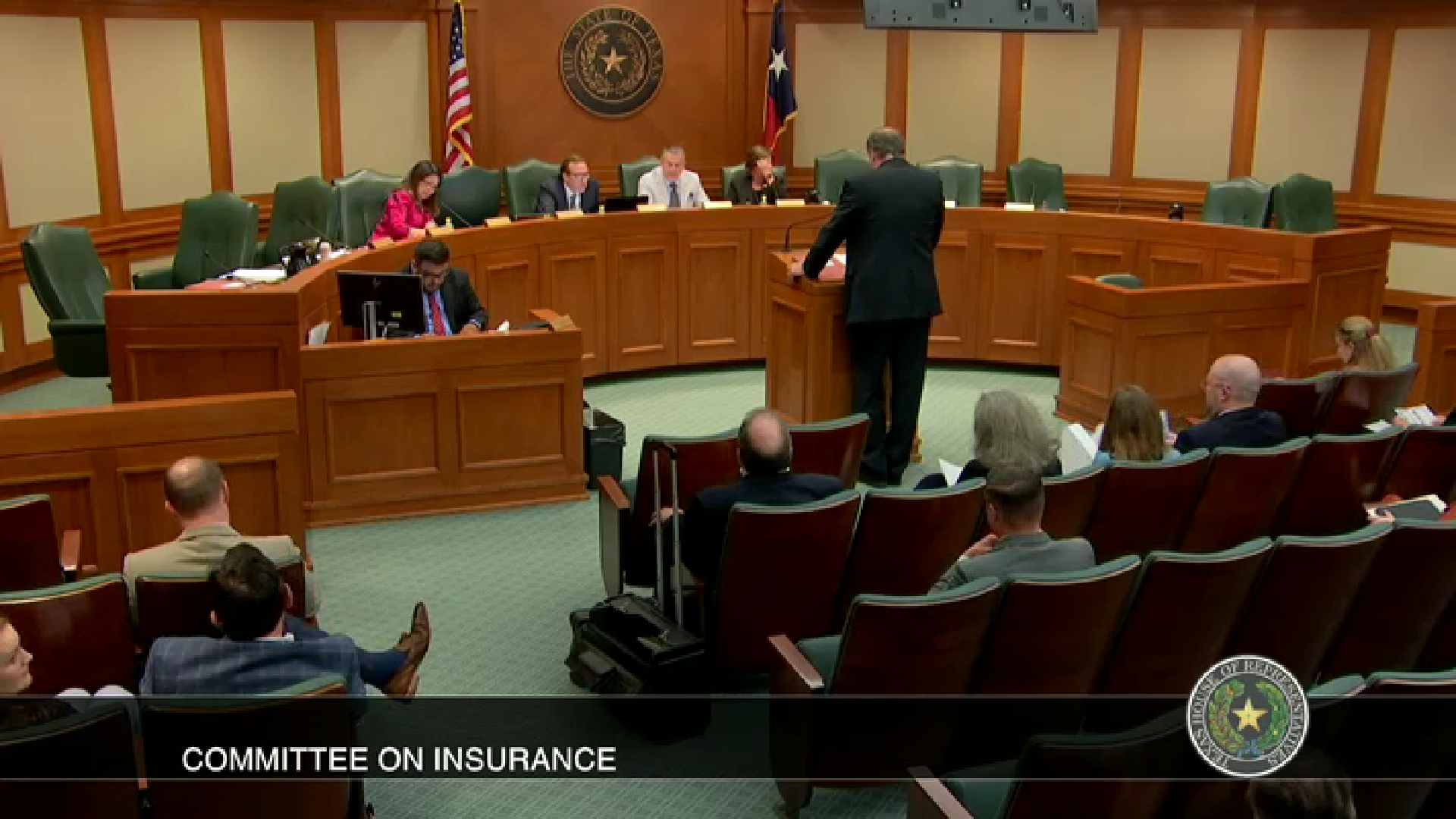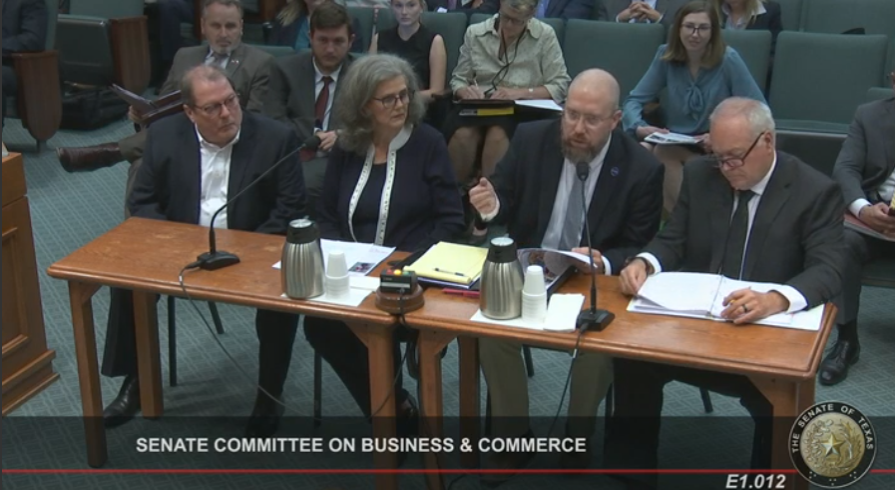
Texas mandatory appraisal bill pending in committee, substitute makes some headway
By onInsurance | Legal
A Texas bill aimed at ensuring the accuracy of repair bills and the mandatory right to appraisal on insurance policies seemingly would have gained more traction if a full committee substitute had been carried forward.
HB 1437, sponsored by Rep. Travis Clardy (R-District), and its Senate companion bill, SB 554, would amend the state’s insurance code to ensure the accuracy of repair estimates within Texas auto policies. The bill is consistent with recommendations in January from the Texas Office of Public Insurance Council (OPIC) that the right to appraisal on insurance claims be made a mandatory part of policies. The Texas Department of Insurance (TDI) also highlighted the issue in its biennial report.
During hearings before the House Insurance Committee and Senate Business & Commerce Committee on April 18, insurance carrier representatives still opposed the bill but only because of “fee-shifting” to insurers, meaning they would cover the costs of the appraisals if the amount of loss is determined to be more than 10% greater than the amount of the insurer’s last offer, according to the bill substitute.
Clardy explained to the Insurance Committee that the substitute ensures appraisers are competent and impartial and clarifies timelines and guidelines for the dispute resolution process. The appraised value difference would also be changed to 10%.
“I do want to stress at this point, this has been an ongoing effort during the interim since our last session,” Clardy said when laying the bill out to be heard. “There have been multiple meetings with the Texas Department of Insurance. The Independent Insurance Agents of Texas have been active participants in these discussions and negotiations. We received input throughout the process from the automobile insurance underwriters on the language that is now before this committee and the committee substitute.”
After hearing testimony, Chairman Tom Oliverson (R-District 130) withdrew the committee substitute.
“This is such a common sense solution,” Clardy said. “It is patently fair. Either side can avail themselves of this and make sure experts will represent them because too often insurance companies do have an uneven body of knowledge [and] experience when they go against people that only have one car wreck or fender bender in their life. …They [TDI] are concerned about the withdrawal of the appraisal clauses being attempted by multiple carriers. They started with State Farm and GEICO is now making that effort and others are certainly going to follow suit. Why? Because they think it’s going to result in them having to pay claims. We’ve heard of the disparity in the amounts that are being paid for total loss or damage. That trend would continue and would accelerate.”
Reagan Elmer, representing the Independent Insurance Agents of Texas, said appraisals are “ultimately good for the policyholder and our customers as the independent agents so we are for appraisals.”
He added that his organization worked with the bill authors on the timeline included in the committee substitute.
Kelly Taft, director of organizing for the consumer advocacy group, Texas Watch, noted as Ware Wendell, the group’s executive director did to the House Insurance Committee, that Texas Watch reviewed over 1,200 auto insurance claims files and in auto property repair claims, invoking the appraisal clause helped consumers recover, on average, $5,300 more. On total loss value claims, an additional $3,800 was recovered. And across the 1,200 claims, $5 million more was recovered by those consumers.
“Consumers need to have options when dealing with our insurance companies and fair auto appraisal,” Taft said. “Give Texans an option when the insurance company offers too little on a total loss or a repair claim… Appraisal is necessary and we need fair appraisal in auto policies with clear deadlines and definitions so everybody is on the same page.”
John Schnautz, with National Association of Mutual Insurance Companies, noted that at the global level of the auto insurance market in Texas, “it is not indicative of there being some systemic abuse going on here, both in terms of the returns in the market over the last five years and also in terms of TDI complaints.”
Although the committee gave an unfavorable recommendation on another appraisal bill for residential property and private passenger auto insurance lines, Schnautz said it would be the better and more comprehensive approach for the legislature to take. He also testified before the Senate Business & Commerce Committee on the companion bill.
“We have worked very hard to get the industry comfortable with the concept of making appraisal mandatory,” he said. “That’s a big deal. Most states don’t do that.”
During the Senate Business & Commerce Committee’s hearing on SB 554, Beamon Floyd, director of the Texas Coalition for Affordable Insurance Solutions, said the coalition is opposed to the bill but does “appreciate the direction that the substitute is going.”
“We do agree that appraisal is very important and are working in a variety of spaces on this appraisal process,” he said. “Our chief issue with 554 is the fee-shifting provision in the bill that has one party or the other pay depending on the outcome of the appraisal. We think that there shouldn’t be a shift and each side should pay their cost of the appraisal to preserve the objectivity of that appraisal.
“We think there’s other language that we need to make sure that all companies in the marketplace would not have to automatically refile their policies, which would be expensive and quite an avalanche for TDI. But we would love to work with Chairman Hughes and his folks on our issues.”
Cindy Hellstern, a Dallas, Texas resident, asked the committee to give a favorable recommendation on the bill for the benefit of consumers. She shared how minor body damage on her SUV turned into a monthlong dispute with her carrier, USAA, that would have left her without a vehicle if she hadn’t been able to invoke the appraisal clause.
At first, USAA gave her a $2,600 repair estimate then delivered a total loss notice to her without any prior notification, she said.
“It took seven months. I got $5,000 more than I would have gotten, and on the very last day of seven months, no salvage title,” Hellstern said. “I’m able to repair my car. I kept my transportation. So living on my own and being able to continue to work and carry my grandbabies safely is the best thing that happened to me. Please don’t let them bully us like that.”
Hellstern also testified during the hearing on SB 1437 before the Senate Business & Commerce Committee.
Robert McDorman, director of Auto Claim Specialists, a national public insurance adjuster company, called the appraisal issue serious when it comes to disputes over repair procedures.
“It should never be taken out of the policy, he said. “It has to do with the repairability and the methodology of the repair. I am for the bill. Our average total loss increase on the total loss claim is $3,800 or 28%. The average increase on the repair procedure dispute that we handle is $5,400. So the numbers are very big and what we deal in and this problem is becoming more and more serious.”
Neither committee took action on the bills.
Images
Featured image credit: fstop123/iStock
All other photos courtesy of Texas legislature via video broadcast screenshots
More information
Texas lawmaker contends Safe Auto Repair Bill would mandate carriers uphold policy contracts


